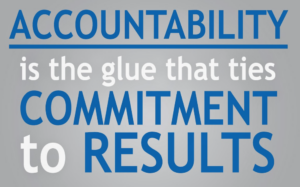If you’ve been following my work over the past couple of years, you know that I’ve been evangelizing the message that “work is a relationship, not a contract.” Because employees experience work this way, work and the workplace should be designed around the same principles that make a relationship healthy–things like appreciation, acceptance, and commitment.
As I speak and write more about what this means, I’ve been encountering an interesting objection.
“What about accountability?”
The assumption is that if we treat work like a relationship, it’s all about feel-good emotions without any regard to performance and getting things done. The fear, it seems, is that if we treat work like a relationship, accountability and performance management go out the window.
I was caught a little off guard by the question at first. But as I’ve thought about it, I think I understand where it comes from.
There are many kinds of relationships. Friendships, acquaintances, family, neighbors, and many more. If you imagine the work relationship as a friendship or a neighborly acquaintance, then it’s hard to connect the dots for how it translates into performance.
The work relationship between employee and employer is a formal, mutually-committed relationship in the way that a marriage is in our personal lives. Both parties have made the choice to enter into this relationship. And while there are some laws in place that outline certain parameters of the relationship, what sustains the relationship and makes it work is an ongoing shared commitment to one another, reinforced by the experience of the relationship itself.
There is nowhere in my life that I feel more accountability than in my relationship with my wife, Angie. I often say that one of my life philosophies is “Happy wife, happy life.” And while that usually gets a chuckle from whoever I’ve just said it to, it’s true. To me, it means that I’m committed to doing what is in my control to keep her happy.
I can’t control how Angie (or anyone else) feels. But, I recognize that how I show up every day, the way I behave, and what I give to the relationship can have a profound impact on her and how she feels.
I know when I don’t contribute around the house adequately, it will have consequences on our relationship. As a result, I try to do what I can every day to pull my weight and check in from time to time to see how it feels to her.
If we don’t make time for one-on-one time together to talk, it causes us to fall out of balance. So, I make time when we need it. These are but two examples of many of how being accountable to the relationship is what makes it work.
Accountability is core to any healthy relationship.
In the employee-employer or employee-manager relationship, the problem is that the accountability goes mainly in one direction. Employees are held accountable and expected to be accountable to the organization, but they aren’t often rewarded with the same commitment from the organization.
For example, if you do something that makes your boss feel insulted, there will be some backlash for you as an employee in one way or another. But, if a boss does something that makes you feel insulted, it can feel like there’s no way to even address that in a safe and constructive way. One way accountability.
Healthy relationships are reciprocal and balanced. Each party actively invests in and is committed to the other. When it’s one way, the relationship starts to deteriorate. If you’ve ever been in a relationship where one person was far more committed than the other, you know how that usually ends. It’s not good.
Accountability in a relationship of any type requires these basic things:
- Clear expectations. You can’t live up to expectations you aren’t aware of or that you don’t understand.
- Communication. Being in an ongoing conversation about how things are going and what is changing is critical. These conversations produce feedback about how things are going and provide the opportunity to learn and adapt.
- Commitment. Being accountable in the relationship means that you will sometimes need to do things that you don’t want to do or could get away without doing. You do these things willingly for one another.
That last bullet is a big one, particularly in the work relationship. Decades of layoffs and downsizing have created an expectation for employees that commitment from employers is conditional and often fleeting. That means that employers and leaders must go above and beyond to both articulate and demonstrate their commitment to employees.
As you prepare for the weekend, I’d challenge you to think about how you could demonstrate and reinforce greater commitment to your employees as a way to strengthen the relationship.

